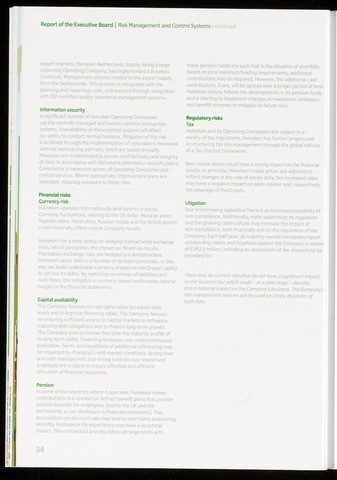34
Report of the Executive Board Risk Management and Control Systems
export markets. Heineken Netherlands Supply, being a large
exporting Operating Company, has implemented a Business
Continuity Management process related to the export supply
from the Netherlands. This process is integrated with the
planning and reporting cycle, and secured through integration
with ISO-certified quality assurance management systems.
Information security
A significant number of Heineken Operating Companies
use the centrally managed and hosted common transaction
systems. Unavailability of these central systems will affect
our ability to conduct normal business. Mitigation of this risk
is achieved through the implementation of redundancy measures
with our outsourcing partners, which are tested annually.
Measures are implemented to secure confidentiality and integrity
of data, in accordance with Heineken's information security policy.
Compliance is measured across all Operating Companies and
central services. Where appropriate, improvement plans are
executed, reducing exposure to these risks.
Financial risks
Currency risk
Heineken operates internationally and reports in euros.
Currency fluctuations, relating to the US dollar, Mexican peso,
Nigerian naira, Polish zloty, Russian rouble and the British pound
could materially affect overall Company results.
Heineken has a clear policy on hedging transactional exchange
risks, which postpones the impact on financial results.
Translation exchange risks are hedged to a limited extent.
Heineken raises debt in a number of its main currencies. In this
way we avoid undesirable currency-impact on the Group's ability
to service its debts. By matching currencies of liabilities and
cash flows, this mitigates a currency impact and creates natural
hedges in the financial statements.
Capital availability
The Company focuses on cash generation to reduce debt
levels and to improve financing ratios. The Company focuses
on ensuring sufficient access to capital markets to refinance
maturing debt obligations and to finance long-term growth.
The Company aims to further fine-tune the maturity profile of
its long-term debts. Financing strategies are under continuous
evaluation. Terms and conditions of additional refinancing may
be impacted by changing credit market conditions. Strong cost
and cash management and strong controls over investment
proposals are in place to ensure effective and efficient
allocation of financial resources.
Pension
In some of the countries where it operates, Heineken makes
contributions to a number of defined benefit plans that provide
pension benefits for employees (mainly the UK and the
Netherlands as per disclosure in financial statements). The
assumptions on discount rate may lead to short-term accounting
volatility. Increase in life expectancy may have a structural
impact. The contractual and regulatory arrangements with
these pension funds are such that in the situation of shortfalls,
based on local minimum funding requirements, additional
contributions may be required. However, the additional cash
contributions, if any, will be spread over a longer period of time.
Heineken closely follows the developments in its pension funds
and is starting to implement changes in investment strategies
and benefit schemes to mitigate its future risks.
Regulatory risks
Tax
Heineken and its Operating Companies are subject to a
variety of tax regulations. Heineken has further progressed
in structuring tax risk management through the global roll-out
of a Tax Control Framework.
Beer excise duties could have a strong impact on the financial
results. In principle, Heineken's sales prices are adjusted to
reflect changes in the rate of excise duty, but increased rates
may have a negative impact on sales volume and, respectively,
the coverage of fixed costs.
Litigation
Due to increasing legislation there is an increased possibility of
non-compliance. Additionally, more supervision by regulators
and the growing claim culture may increase the impact of
non-compliance, both financially and on the reputation of the
Company. Each half year, all majority-owned companies report
outstanding claims and litigations against the Company in excess
of EUR2.5 million, including an assessment of the amounts to be
provided for.
There may be current risks that do not have a significant impact
on the business but which could -at a later stage - develop
into a material impact on the Company's business. The Company's
risk management systems are focused on timely discovery of
such risks.

